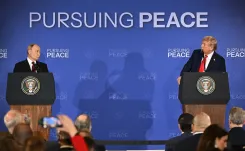Why Did a Sanctioned US Judge Praise Brazil's Constitution?

Synopsis
Key Takeaways
- Brazil's Constitution promotes judicial independence since 1988.
- Justice Moraes praised its resilience against external pressures.
- The US sanctions raised concerns about interference in Brazil's judiciary.
- Dialogue and respect for sovereignty are crucial in international relations.
- Brazilian officials criticized the US for monitoring judicial actions.
Sao Paulo, Aug 12 (NationPress) Brazil's Supreme Federal Court Justice Alexandre de Moraes, who faced sanctions from the United States for his role in the trial of former President Jair Bolsonaro, commended Brazil's constitution on Monday for securing a robust and independent judiciary, effectively resisting both external and internal pressures.
"Since 1988, the Constitution has bestowed independence and autonomy upon the judiciary—financial, administrative, and operational autonomy—allowing its members to make decisions in accordance with the Constitution and the law, free from domestic, foreign, or any other pressures," he stated during a speech in the southeastern state of Sao Paulo.
Moraes emphasized that no individual can overturn decisions issued by the Supreme Federal Court, according to Xinhua News Agency.
His comments arrived amidst growing criticism from Washington, which is reacting to his involvement in the ongoing trial against Bolsonaro.
The US government has included Moraes on its list of individuals subject to financial and other sanctions under the Magnitsky Act, a law aimed at penalizing foreigners accused of human rights violations or corruption by Washington.
Recently, Brazilian Supreme Court Justice Flavio Dino criticized the US Embassy for stating it would "monitor" the activities of a judge.
This comment was in response to the US Embassy in Brasilia warning allies of Justice Alexandre de Moraes—who was sanctioned in July under the US Magnitsky Act—against supporting his actions, stating, "We are closely monitoring the situation."
"I would like to remind everyone that, according to international law, it is not the role of any foreign embassy to 'warn' or 'monitor' the actions of a justice of the Supreme Federal Court or any other Brazilian court," Dino expressed on Facebook.
Moraes was sanctioned by US Secretary of State Marco Rubio for alleged abuse of authority, suppression of free speech, and human rights violations. He is overseeing the criminal case against former Brazilian President Jair Bolsonaro, who has been accused of attempting to overturn Brazil's 2022 elections.
"Respect for national sovereignty, moderation, common sense, and courtesy are vital in diplomacy. I hope that dialogue and amicable relations between nations that have historically been partners in trade, culture, and institutions will be restored. This is in the best interest of all," he added, as reported by Xinhua News Agency.
Brazil's Foreign Ministry summoned US Charge d'Affaires Gabriel Escobar to file a formal protest and seek an explanation.









